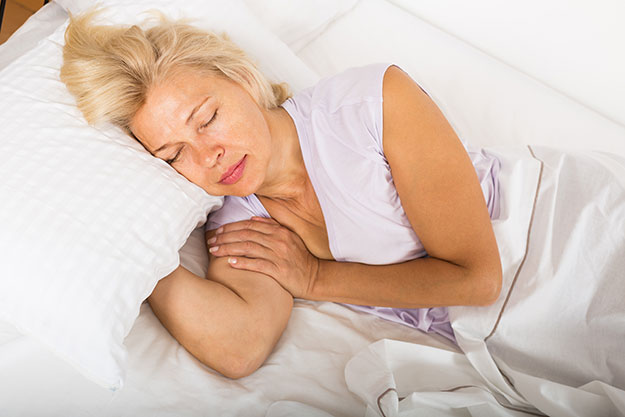
In addition to experiencing hot flushes during the day, many women can also suffer from them while asleep, known as night sweats. This can be a major nuisance, as night sweats interrupt your sleep and make you feel very uncomfortable.
Keep reading to learn more about this menopausal symptom, and find out how to control it.
What causes night sweats?
Hot flushes and night sweats are caused by fluctuating oestrogen levels. When this fluctuation occurs, the hypothalamus (which is the region of the brain that regulates body temperature and is controlled by hormones) becomes confused. It responds to these changes in oestrogen levels as if it were sensing an increase in your body temperature, when in reality your actual body temperature has remained steady.
In order to keep your temperature down, the hypothalamus dilates blood vessels, which releases heat and activates your sweat glands. Because all of this happens very suddenly, you can wake up feeling chilly, anxious, and with a racing heart.
Things you can do to keep night sweats at bay
There are a couple of things you can do to keep night sweats in check, and start enjoying an interrupted, long sleep. Some of the things you could try are:
Try to minimise the impact of interrupted sleep
We’re not saying get used to waking up every night in a sweaty bed, but rather, do everything in your power during the day to encourage a deep and restful sleep. Eating healthily, exercising, meditating, and allocating exclusive time for your own personal needs will make you feel better and more energetic during the day. This means, even if your sleep is disturbed, it won’t have as much of a negative impact on you.
Relaxation
Relaxation techniques such as meditation and slow, deep breathing may help reduce menopause hot flushes and night sweats.
Reflect on your day
It’s possible certain activities and the consumption of certain foods, alcohol or tobacco may worsen symptoms of night sweats. Therefore, it could be worthwhile keeping a journal of your daily activities and diet to see if any patterns emerge. If you are able to identify potential contributing factors and cut them out of your life, you could significantly reduce your night sweats symptoms. It’s also a good idea to drink plenty of water throughout the day, and to avoid eating close to bedtime.
Make your bedroom comfortable
Keep a fan in your bedroom or turn the air-con on a low setting, and try to maintain good airflow through the room.
Use a powerful deodorant
While not exactly a cure, using a clinical deodorant can help to reduce the problem. Apply to parts of the body that are most sweaty, not only your underarms. These can include your feet, groin, and back.
Try hormone therapy
Hormone replacement therapy may reduce some of the symptoms of menopause, such as night sweats. Talk to one of our doctors at the Australian Menopause Centre if you’re considering this option, as they will be able to discuss the risks involved, as well the potential benefits.
Natural Herbs
There are mixed results and differing opinions on the use of natural herbs as remedies for menopause, however there are a few which are commonly used to treat its symptoms. Dong Quai is the second most widely used herb in China, and can be beneficial for hot flushes and vaginal dryness. St John’s Wort can be used for mood swings, depression, relaxation, and can be drunk as a tea or found in supplements. Ginseng treats fatigue, anxiety and stress, while Chasteberry reduces symptoms such as hot flushes. These herbs may provide relief from some symptoms of menopause.
Exercise
Being active is a great way to stay healthy and avoid future complications, and is effective at reducing symptoms of menopause. Regular physical activity (and being fit in general) is likely to reduce the severity of night sweats. Cardiorespiratory activities, including walking and yoga, are an effective way to reduce menopausal symptoms. It’s a good idea to engage in regular physical activity, not only for the likely reduction in night sweats, but also for the multitude of benefits that comes with being active and healthy.